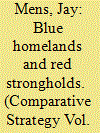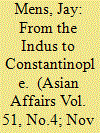| Srl | Item |
| 1 |
ID:
188361


|
|
|
|
|
| Summary/Abstract |
Libya’s geopolitical importance stems from its vast energy resources, its position in relation to Southern Europe, and its position at the entrance to the Eastern Mediterranean. Over the last two years, Libya’s civil war has provided an opportunity for Russia and Turkey to compete for long-term strategic gains in the Eastern Mediterranean. This article examines the geopolitics of Libya and the involvement of Russia and Turkey in the Libyan Civil War in the context of their interests and strategies in the Eastern Mediterranean, arguing that Russian and Turkish involvement in Libya broadly follows a deeper pattern of Russian and Turkish strategy in the Mediterranean that began in the 18th Century.
|
|
|
|
|
|
|
|
|
|
|
|
|
|
|
|
| 2 |
ID:
182831


|
|
|
|
|
| Summary/Abstract |
This article argues that Napoleon Bonaparte's attempt to reach India, firstly through Egypt and then through Qajar Persia, inaugurated the ‘Middle East' as a coherent political space in international politics. The ostensibly existential threat posed by French schemes to British dominion over India prompted British Indian officials to perceive Egypt, Persia and the Gulf Emirates through the lens of Indian defence and European geopolitics for the first time. By the end of this period, these lands were imagined as a salient, somewhat coherent political space between “the Indus and Constantinople”. This first ‘Middle East’ was the product of the globalization of European geopolitics and the need to defend British India, auguring the future of the region, in which its political importance, and even its location, was constructed in relation to the broader context of international affairs.
|
|
|
|
|
|
|
|
|
|
|
|
|
|
|
|